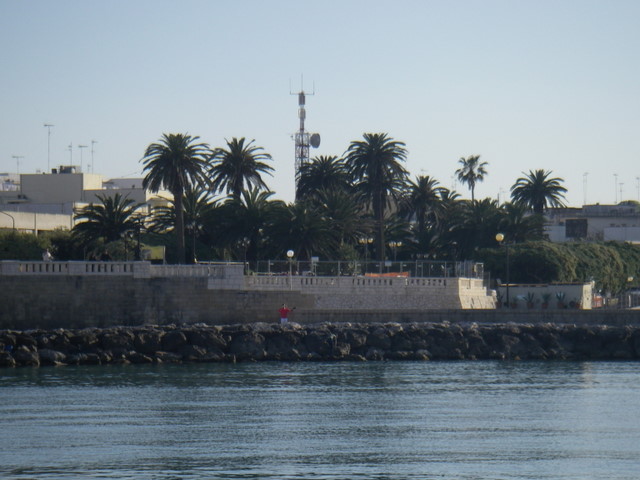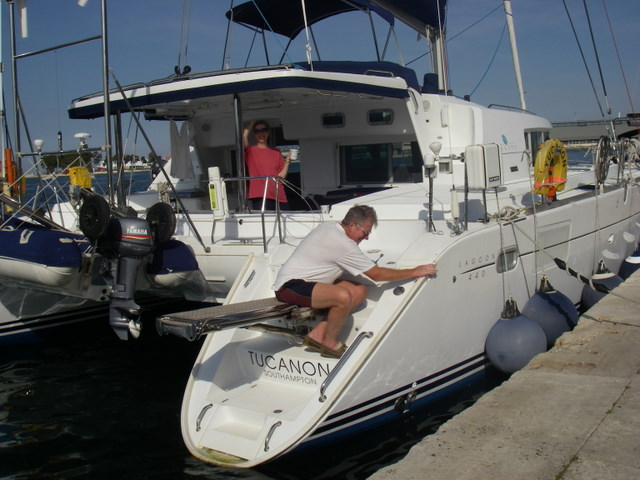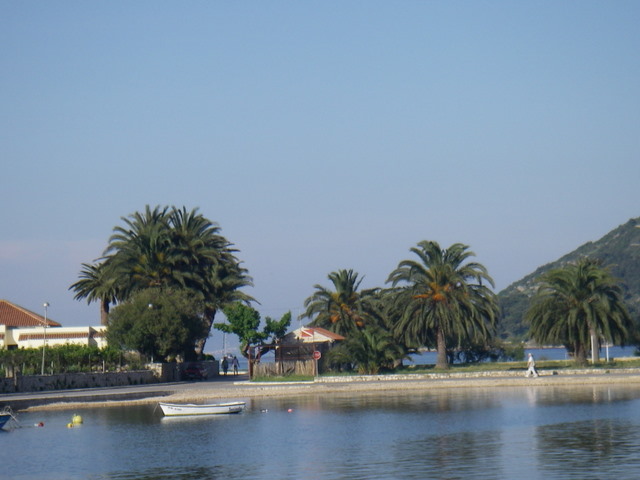Off to Croatia

|
The chap who came to investigate the grating noise, which
occurs when the passerell is extended, initially diagnosed that the problem had
been caused by a build up of salt. Having washed off the salt, which had
accumulated during the sail to The journey from Santa Maria di Leuce was flat calm, with never more than a force 2 blowing, from the direction we were traveling. The sun blazed. During the first hour of our journey, we passed many large caves, which were being visited by a tripper boat, as we motored past. Three quarters of an hour from our anchorage at Otranto,
2 dolphin came up to the boat to say hello but, like the 2 we had spotted off
The little I had bought some flour for making bread, while we were at Prevasa. In my ignorance, I had assumed that when the shopkeeper told me that it was black, he really meant brown. It soon became obvious that the usual recipes for brown bread, and for whole-meal bread, were not going to work with this flour. The bread being produced was more like German black bread and although very tasty, was not what I wanted. I experimented a little until I finally produced a loaf suitable to our requirements. It was great fun waiting for the bread machine to finish baking and to see what sort of loaf had been made this time. The passage to
Wrong! Not far from Otranto, a chap was firing mortars but fortunately not out to sea. We encountered many small fishing boats, a lot of flotsam and jetsam as well as a great deal of sludge from discharged holding tanks. At We left
The wind did come up to a force 2 and we managed to motor sail most of the way. The shipping channel stretched to 50 miles offshore and there was hardly a moment when there wasn’t a ship in sight, sometimes several. A number came as close as half a mile and some less than that. It was necessary at times for either us, or the other ship, to take avoidance action. During this busy period, the navigation equipment decided to play up and countless times we had to reset it. We were inundated with flies. There were so many that a
huge batch of them must have hatched after we had left
By the time it was dark, the worst of the shipping
traffic was behind us, as was the Raymarine problem. The equipment still went
wrong at Dick was on watch between Soon after The flies remained a problem throughout the day, though
we managed to dispose of most of them and the rest jumped ship once we arrived
at The approach to The guy who took our lines and passed us the lazy lines,
told us that the office, where we needed to take our boat papers, was closed
until The setting was very picturesque and we anchored in the
bay overnight. Next morning, Dick took the dinghy ashore. The office didn’t open
at After breakfast, we moved the boat to a space on the quayside, which had been occupied earlier, by a police boat. Dick went ashore and tried again. This time he succeeded in getting the necessary paperwork done and for €255 we are now able to sail in Croatian water for a period of up to 12 months. We cast off in sunshine and made passage for Zirje. Just after 1o’clock, Caroline spotted dolphins 200metres away. The dolphins were not interested in us they were too busy performing for a fishing boat. The sun still tried hard but the visibility was becoming
hazy. The forecast warned of fog offshore. So pleased we had done the overnight
passage the night before last. It would have been awful having to cross the
There was just enough wind, to sail on a broad reach, for
half an hour, using the parasailor, just after We tied up to a buoy when we arrived at Zirje, barbecued a rib of beef and had just finished supper when a chap arrived for the mooring fee. He wasn’t an official and had no receipt or identification but said that he had been collecting money from yachties for as long as he could remember. We declined to pay the fee and having been assured that it was quite permissible for us to anchor, we did so. Our preference is to anchor, rather than use a mooring buoy. One is never certain how large a boat the buoy can hold, or how well the mooring is maintained. Another long day, as we make passage along Murtersko More, through the centre of the islands to Skarda, then, changing our minds on passage, because the wind is going to change direction during the night, anchored at Ist instead, spotting dolphin on the way.. The next leg of our journey was to Kanalic, a passage taking 10 hours, half of which we were able to sail, using the parasailor. Once again we were delighted to be visited by dolphin. We have seen more sailing boats on passage today, than we have seen since leaving Prevasa at the end of April. Kanalic is the most picturesque place that we have seen
since leaving Just 7 miles on from Kanalic, we reached
As we approached the industrial looking city, we passed, on both sides of the natural harbour, what appeared to be a considerable number of deserted buildings, which had probably been used by the armed forces, naval or military. It is from
Below: View from our anchorage at Otranto, Italy Dick cleaning the boat encouraged by Caroline View from our anchorage at Vis
|


